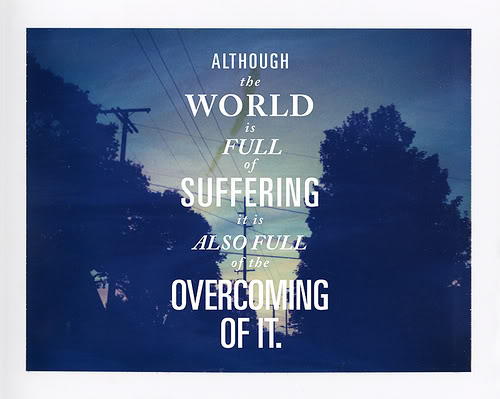re·sil·ience [ri-zil-yuhns, -zil-ee-uhns] noun
1. the power or ability to return to the original form, position,etc., after being bent, compressed, or stretched; elasticity.
2. ability to recover readily from illness, depression,adversity, or the like; buoyancy.
In early October of 2010, my father had a back surgery that changed all of our lives. While we believed that the surgery went well and were able to see Papito in recovery, the next morning, he went into respiratory arrest when his windpipe collapsed from inflammation (the surgeon had gone in through his neck). Dad was immediately put into a medically induced coma to give his body time to heal. Initially, the doctors had no idea why dad had arrested and so there were all sorts of frightening scenarios- a stroke, a heart attack, an aneurysm. While we sat like little broken dolls around his ICU bed, they would float one of these ideas by us. For my mother’s sake, on the surface, I kept things together. Inside, though, I was slipping away from reason, from strength, from the ability to do anything but quietly weep. I distinctly remember, over and over again, wanting to do nothing but walk out of the hospital, drive to my childhood home, lock my bedroom door, and climb into my childhood bed. It was just too hard. Too much was being asked of us. I am the baby of this family, someone treat me like it; I wanted to pout. But I couldn’t.
And so, instead, every time I went to the bathroom and had a minute by myself, I steeled myself for what I had to do. I had to interpret the doctor’s comments, I had to figure out when and how we were going to eat, I had to get my mom to and from the hospital and keep her together emotionally, I had to call relatives and friends and update them (and make sure I was explaining all of this medical jargon correctly in Spanish), I had to handle Happy’s school logistics and babysitting logistics from out of state, I had to meet visitors in the waiting room. And that was just the stuff that came up because of this emergency. It did not touch the fact that I had students back home, a non-profit to help run, a book that had just come out 1 week before that I was supposed to be promoting.
So I just gave myself each task and a strategy for accomplishing it and I just tried to string one, two, three things together. Each time, our incredible nurse pulled me aside to give me an update on what the latest test showed, what dad’s vitals meant, what the doctors liked or didn’t like, I would weep. ”Why do you cry every time you talk to Jeff?” My brother asked me at one point. And here is what I realized, when I talked to Jeff was the only time where I wasn’t expected to have an answer, where I could just feel what I was feeling; he held the answers for me while I just felt what I felt. My time with Jeff was when I could just be real. And I needed that, just as sure as I needed to have it together when I was talking to my mom or relatives in Puerto Rico or the doctors.
So, why this story today? Because, recently, a blog reader asked me about resilience. How does one build resilience in herself? How does she exercise it? For a little while, I sat on that question, wondering if I had anything of insight to really offer. But then I remembered. I remembered how my heart wanted to spend the entire fall and winter of 2010 in my childhood bed with the covers drawn over my head, but how I got up every day and got us to the hospital, how I drove the highway back and forth between states to be a mom and a teacher and a daughter and a caregiver, how I strung together tasks and hours and days and weeks into something. How maybe I lost my buoyancy, how maybe I am not quite back into my original form, but that I am in a form of its own power, brought to me by the experience of staring down something I did not think I could do, something that wanted to conquer me, and conquering it instead.
So, here it is, a little roadmap for resilience, at least the way I have eeked it out for myself.
1. Acknowledge the feeling and figure out what it is about. It starts with a feeling we don’t like. Perhaps it is fear or anger. Whatever it is, the very first thing you have to do to build resilience is to name it. ”I feel scared and want to hide from this situation.” ”I feel vulnerable and want to say something mean out of spite so that he feels vulnerable, too.” ”I feel angry and want to strike out to get this feeling out of my body.” Whatever it is that’s going on and that you want to build a resilience to/for has to be named/ claimed. So start summarily naming your feelings. Just this exercise alone has helped me tremendously when I feel anxious as I always get the physical “pit in my stomach” feeling. I can’t do much with that feeling until I name it, but as soon as I do, now, I have a way of working my way through the anxiety because I had a little roadmap towards resilience.
Now, once you’ve named it, add a layer to it. Add because to the end of your statement. ”I feel scared and want to hide from this situation because I might have to make decisions I am not prepared to make.” Knowing your feeling and your because will help you come up with a plan towards resilience. If you can’t come up with your because, write about it or talk about it until it comes out. If you give it room, it will reveal itself.
2. Consider how and why it matters that you do something different. So, my instant, secret desire during that time two years ago was to take to the bed. So the first thing I had to do was to identify all the reasons that I couldn’t. That is step 2 on your road to resiliency. When something really tests us, we often want to have pretty basic responses that are rooted in survival. They aren’t high energy solutions. They are low energy solutions because we think we need to conserve all our energy for the next shoe to drop. That is what your mind is telling you, but that’s your scared, pissed, vulnerable mind talking. Deep down inside, you know that expending some right energy will actually help the situation. But, first, you have to reason with yourself. Why can’t you (or shouldn’t you) go with your base instincts? My mom and dad needed me. That’s why it mattered that I do something different. Why do you need to do something differently?
3. Find your information. Now, it is time to really assess what your default might be in this situation. But watch your language, your default is not a weakness. There is no need beating yourself up in the midst of your desire to build resilience because that is counter-productive. Just know what you are grappling with in this situation not just from the situation but also from your tendencies. For example, I knew that I would get tired of explaining and would get to the point where I just wanted to tell my mom what to do/ what we were doing, because, come on, I’ve been talking for us non-stop for 3 days and can you just trust me at this point and not make me explain it in English, Spanish, Spanglish and something else. Except that when I get impatient, it just brings out all her stuff. So I knew I just needed to fight my impatience and give her as much explanation as she wanted, as often as she wanted (I still only did this marginally, but I certainly did it better than I would have had I not thought ‘what about me might make this situation harder?’).
4. Develop a realistic goal. Now, it is time to set some realistic goals for the situation. Make them small and very doable. So, for example, your kid knows how to push your buttons and you are inclined to scream to get things back on track when they veer terribly off course and, yet, inside, you desperately don’t want to be the screamer. Realistic goal # 1? You will count to three before any reaction. Realistic goal # 2? You will find your child’s currency so you know what to dangle in the air rather than yell (for example, Happy’s currency is not time out. If I say, you ‘ll have to go to time out if you do that again, he’ll do it again and then look over his shoulder at me, smugly, as he marches to time out. I kid you not. However, if I say, you are going to lose a book– he gets to have 5 books read to him before he goes to sleep- he more often then not (but not every time) decides that whatever is is not worth the loss of a book). Realistic goal # 3? You will talk in a very soft, almost impossible to hear voice instead of yelling. There are options; you just have to pre-think your alternatives. And then start trying them. Tweak them as you gather information, and just keep fine-tuning the system.
5. Get perspective. A few weeks ago, I was about to go full-tilt into a disagreement with Happy when I thought, why does this even matter? It didn’t. It wasn’t going to keep him more safe, healthy, rested, or well. Whatever it was, which I can’t even remember now, just really didn’t matter. It’s just that I preferred for him to do it this way and he wanted to do it that way. As soon as I realized that, all of the fight went out of me. ”That’s cool,” I said. And he did however he wanted. And we avoided the colossal stand-off that was coming because I wanted to be in charge. I have now developed a whole approach around this that I call “steering into the skid.” Maybe one day that will be its own blog post. Meanwhile, get some bigger picture perspective about the whole thing.
6. Connect. Make sure there is someone in your life that you can confide to as you are going through these motions as they can be intense. Maybe it’s a therapist, a partner, a sibling, or a BFF. Just have a person or two that you can go to and be very real about it. That helps.
7. Be hopeful. A resilience road map only works if you have hope that things can change or that you can contribute something positive to a situation even if it is a hard situation. So have hope. Believe in what you bring to the table.
8. Take care of you. When things get hard, the very first thing we are apt to do to make room for the hard is to give up on our own care. We quit eating the way that makes us feel the best; we quit moving our body; we stay up all hours, etc. Resist that urge.
So, what is on your road map for building resilience? What have you heard learned through difficult challenges or periods of resilience?
this post was originally shared on July 11, 2012.





